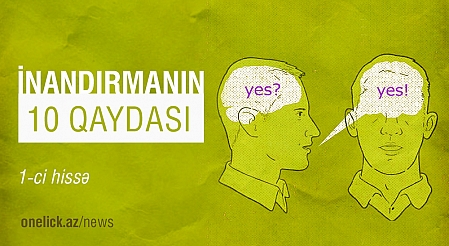- Oneclick.az
- Xəbərlər
- Business
- Ten rules of persuasion (part 1)
Ten rules of persuasion (part 1)

First rule: rule of Homer
Priority of the made arguments affects their credibility. The following order of arguments is more convincing: strong - medium - the strongest one. This rule implies that the weak arguments is better not to use: to identify them in the process of training, do not use of them for persuasion. They will harm rather than benefit. Indeed, the caller pays more attention to the weaknesses in your arguments. Therefore, it is important not to make a mistake. Not the number of arguments determines the outcome of the case but their reliability. It is necessary to note one very important fact. The same argument can be strong, and weak for different people. Therefore, the strength (weakness) of argument must be determined from the point of view of the interlocutor.
Second rule: rule of Socrates
For a positive decision on an important issue for you, put it in the third place, prefacing it two short, easy-to-companion questions to which he wll simply answer you "yes". This rule exits for 2400 years, it has been experienced by some hundreds of generations of the educated people. It is alive because it is true. The deep - physiological (!) - reasons have only relatively and recently been clarified that explain the effectiveness of this technique. It was found that when a person says or hears "no", norepinephrine hormones are customized in his blood, leading him to fight. Conversely, the word "yes" leads to the release of "pleasure hormones" (endorphins). Receiving two portion of "pleasure hormones", the interlocutor relaxes, is favorably adjusted, it is psychologically easier to say "yes" than "no" for him. One portion of endorphins is not always enough to overcome a bad mood, which can remain in interlocutor. In addition, the person can not instantly move from one mood to another, and we should give him more time and more "pleasure hormones" to ensure this process. Anticipating questions should be short, so as not to bore the interlocutor and not take his long time.
Third rule: a cogency of arguments depends largely on the image and status of persuasive man
It's one thing when persuasive – is a respected, esteemed man, another - when he is unnecessary man, not taken seriously. High official or social position, outstanding achievements in any field of activity, education, recognition for others, high personal qualities raise a person's status, and beside it - and the weight of his arguments. Support of the respected person also increases persuasiveness. (In fact, rule 3 is used by those who are asked from the respectful person "to put in a good word for themselves," or refer to the opinion of a respected man of his quote in support of their arguments.) Using of the third rule, the creators of commercials about medicines, supplements and personal hygiene attract doctors, cosmetologists; for advertising of the sporting goods – attracts famous athletes, etc. To apply the rule 3, it should be borne in mind some of the facts and circumstances indicating differences in the perception of status depending on the situation. For example, surveys conducted in the run-up to the election of deputies showed that voters prefer (ceteris paribus) men, not women; middle age, not young and old. On the contrary, in court proceedings in divorcing cases the status of women is perceived by the judges as a whole as a higher (due to the stereotype that such vices as drunkenness, assault, infidelity, selfishness inherent more in husbands).
Fourth rule: do not belittle the status
Any disrespect, disregard for the interlocutor belittles his status and causes usually a negative reaction. One of the masters of advertising expressed it by this way: "Do not think that the consumer of advertising is stupider than you."
Fifth rule: we treat indulgently the arguments of interlocutor that is pleasant for us, and arguments of bad one - with prejudice
The action mechanism of this rule is the same as the rules of Socrates: a nice companion stimulates the production of "pleasure hormones" and reluctance to confront. Unpleasant - on the contrary. Good impression, as you know, creates a lot of factors: appearance, respectful, competent speech, mild-mannered.






